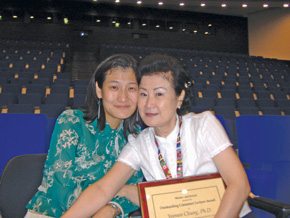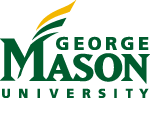Finding Her Voice
Alumna brings personal perspective to research on speech impairments
By Shernita Rochelle Parker
Research shows that more than two million people in the United States are unable to communicate using speech or have a severe communication problem. In view of this fact, how one overcomes the limitations that speech impairments impose and explores tools to help surmount those limitations is an area of much-needed research.
For Yoosun Chung, BS Computer Science ’94 and PhD Education ’04, it was essential to take a deep look at these issues, not only for her research, but for personal reasons. Because Chung herself has a speech impairment and uses augmentative and alternative communication (AAC), her research is even more compelling.
Chung’s speech impairment has done little to hold her back, though. Born in Seoul, South Korea, Chung was hospitalized when she was only nine days old for severe jaundice. Complications from the condition left her with brain damage that affects her speech and mobility. At age two, she was diagnosed with cerebral palsy.
“Over the years, the perspective regarding individuals with disabilities in Korea has changed greatly,” Chung notes. “When I was young, many parents used to hide their children with disabilities. My parents were different; they brought me everywhere they went.”
When she turned eight, Chung’s parents pushed to have her attend a general elementary school instead of a special school. At that time in the 1970s, there was no notion of inclusion, yet her parents believed in her potential and ability to succeed in a traditional elementary school.
Despite the anxiety and shame that she often endured because she was unable to express herself as other students did, Chung worked hard and met the challenges of her speech impairment head on. In 1990, she came to the United States to study, first tackling learning English at Mason’s English Language Institute. She then went on to earn her bachelor’s degree in computer science from Mason in 1994 and her master’s of engineering from Cornell in 1996.
Throughout her undergraduate and graduate academic experience, too often she “simply closed her mouth,” Chung says, relying on e-mail to communicate with professors when she had questions. After she entered the program in assistive technology in the College of Education and Human Development, Chung began to use an AAC device, and it opened up a whole new world to her. Slowly, after learning more about AAC systems, Chung wrote or spelled out words that were difficult for her to pronounce as one of her alternative communication methods. These methods expanded her ability to communicate and sparked her interest in pursuing a doctoral degree.
Using a laptop computer, she types what she wants to say, and then the device speaks the words for her. Chung had long dreamed that she would have a way to express herself more readily.
Now, as a research assistant professor in the Kellar Institute for Human disAbilities, part of CEHD, Chung teaches courses with the assistance of her AAC device. Students in the Special Education Program consistently comment that having a teacher with a disability provides a great learning opportunity.
“Yoosun is a wonderful role model to show what people who have a disability can achieve in their lives,” says Kellar Institute Director Michael Behrmann.
Chung recently was featured in a Korean television network documentary and received the 2006 Words+/ISAAC Outstanding Consumer Lecture Award. ISAAC, the International Society for Augmentative and Alternative Communication, bestows this honor upon an individual who uses AAC, recognizing the individual’s talent, life perspective, or individual scholarly endeavors and expertise.
While humbled by this honor, Chung talks openly about how this and her many other accomplishments, would not be possible without a loving and supportive family. For Chung, her parents, husband, 8-year-old son, and 4-year-old daughter are greater gifts than an award could ever provide.

Yoosun Chung with her mother

